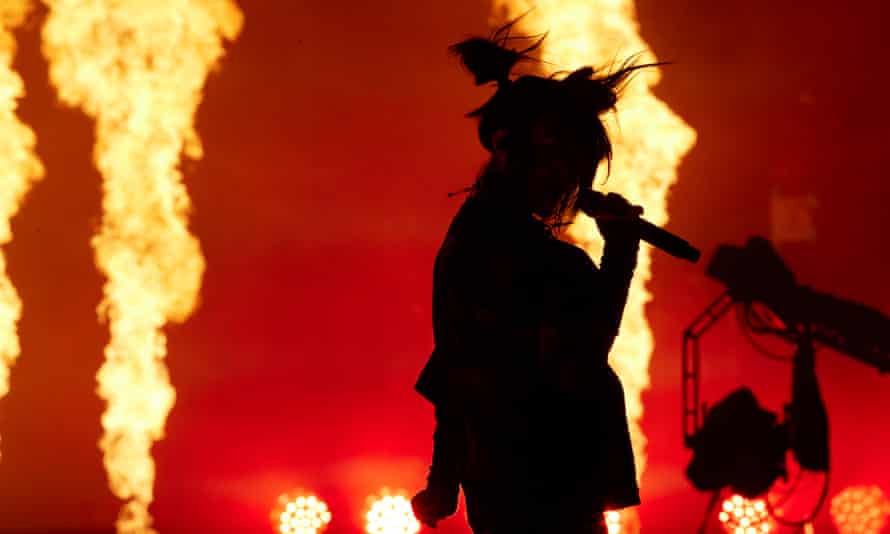It’s not just that Billie Eilish is, as she’s keen to point out, the youngest headliner in Glastonbury’s history … it’s that she’s the first mainstream pop star – as in the kind of pop star that tweenage girls scream at – to headline Glastonbury. A few years ago, the announcement of an artist like that filling the main Friday night slot on the Pyramid stage would probably have generated a degree of controversy. Some berk would have got up a petition about it. But in 2022, the appearance of Billie Eilish’s name at the top of the bill passed without comment.
Whether that’s evidence that Glastonbury’s audience is skewing younger, or that Glastonbury is becoming more pop-facing in the artists it books, or that Eilish is considered of a slightly different stripe to her peers, is an interesting question. Watching her bounce from the industrial electro pop of You Should See Me in a Crown, to the kitschy lounge stylings of Billie’s Bossanova, to the Beatles-y Getting Older, to the Dr Dre-influenced All the Good Girls Goto Hell, one is struck by the sense that she’s certainly more musically eclectic than most of her peers. And if you get the impression that festivals aren’t necessarily her natural habitat – “you guys are troupers, with your tents and shit”, she opines at one point – from the moment she appears, she looks entirely at home.
While many of the artists who appear on the Pyramid stage on Friday seem overawed by the size of the crowd they’ve attracted and the vociferousness of their response – at one point, it looks like Sam Fender is so struck by the moment he might start crying – Eilish looks anything but. There’s something imperious about her performance: it all feels appealingly confident. The set is essentially a truncated version of the show she’s been touring around arenas in recent months, and it comes complete with pop arena show staples including dividing the audience up and getting them to cheer in turn, a lot of talk about empowerment and loving yourself, and videos of the artist as a small child playing on the big screens. But it doesn’t lose anything in translation to a festival setting. If she asks the audience to crouch down and jump, they happily oblige. It’s heavy on slow-moving ballads, which is theoretically risky, but she never seems to lose the crowd.
Perhaps that’s because Eilish is a hugely engaging performer. Moreover she genuinely appears to be enjoying herself, at odds with her pouty gothic image and the plethora of songs on her last album – Happily Ever After – that made being a teenage pop sensation when you’re barely out of her teens sound like a pretty miserable business. Her enthusiasm is infectious, her biggest hits – Burya Friend, Bad Guy – pack an immense bass-heavy punch, while the ballad Your Power, introduced with a mention of the overturning of Roe Vs Wade as “a dark day for women”, has a spellbinding, eerie fragility. By the time she ends with Happier Than Ever’s slowly-building title track – its furiously angry crescendo given an extra layer of theatricality by the sheer quantity of pyrotechnics exploding over the stage – her performance doesn’t just seem like a musical shift for Glastonbury, but a triumph as well.

